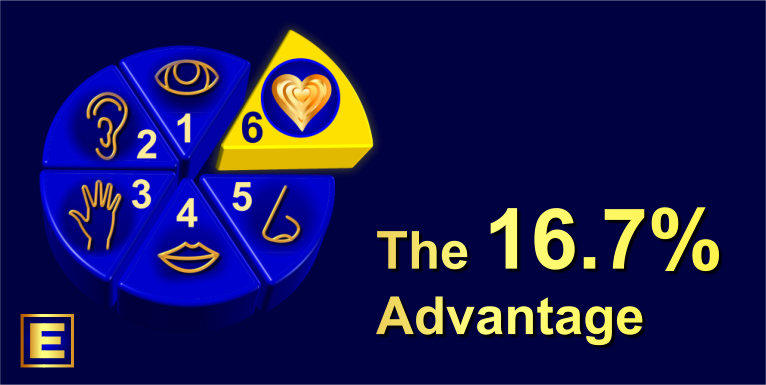
We have (at least) 6 senses, not just 5.
The 6th Sense are the emotions, sensations transmitted through the physical body that are generated by the energy body.
We base our decisions on how reality works on the incoming information; when the 6th sense is excluded, 16.7% of information is missing.
Without that addtional 16.7%, reality doesn't make sense, and especially, human beings do not make sense.
When we add the missing 16.7% into the equation, the dots connect and we start to "see more" - that's a metaphor for understanding more, being able to do more, being less confused and afraid.
Any person who has that 16.7% additional information about any context and any situation has a powerful competitive advantage over those who do not.
This has always been the case throughout the history of humanity.
With Modern Energy, any normal human being can achieve access to the missing data by practising modern energy techniques.
Any person who has experienced access to the additional 16.7% can be termed as "enlightened."
Sensory Equality:
How having 16.7% more information (by recognizing and utilizing the sixth sense of emotions) could solve many problems of humanity.
Sensory equality recognizes that emotions, like sight, sound, touch, taste, and smell, are fundamental sensory inputs that inform our interaction with the world. Just as we trust our eyes to see or our ears to hear, we should equally trust our emotions to sense and respond to our environment.
This perspective acknowledges that emotional data is not of a lesser or different nature but is part of the same sensory spectrum, integral to decision-making, personal well-being, and societal harmony. By valuing emotional sensory input alongside traditional senses, we can achieve a more nuanced, comprehensive understanding of experiences, leading to decisions and interactions that are more empathetic, effective, and aligned with human reality.
Considering the discussion on sensory equality and the integration of emotional data as part of our sensory experience, here's how having 16.7% more information (by recognizing and utilizing the sixth sense of emotions) could solve many problems of humanity:
Enhanced Decision-Making:
Comprehensive Analysis: By including emotional data, decisions can be made with a fuller understanding of their impacts, not just on a logical or physical level but also on an emotional one. This could lead to policies, business decisions, or personal choices that are more sustainable, ethical, and aligned with human values.
Conflict Resolution:
Empathy and Understanding: Understanding the emotional landscape of conflicts can lead to resolutions that address the root causes rather than just the symptoms. This could significantly reduce interpersonal, community, or international conflicts by promoting empathy and mutual understanding.
Mental and Emotional Health:
Prevention and Treatment: Recognizing emotions as sensory data could revolutionize mental health care, where emotional well-being is treated with the same seriousness as physical health. This could lead to better prevention of mental health issues and more effective treatments, reducing the global burden of mental illness.
Educational Systems:
Holistic Education: Educational approaches would incorporate emotional intelligence, teaching students not only to process information intellectually but also emotionally. This could foster a generation that's better at problem-solving, creativity, and social interaction, potentially solving educational and societal issues like bullying or academic stress.
Social Cohesion:
Community Building: With an understanding of emotional dynamics, communities might be built or reformed with a focus on emotional well-being, leading to stronger social bonds, less division, and more inclusive societies.
Innovation and Creativity:
Informed by Emotion: Innovations could be more human-centered, considering how they make people feel as much as how they function. This could lead to technologies or solutions that are not only efficient but also enhance the quality of life by addressing emotional needs.
Leadership and Governance:
Emotionally Intelligent Leadership: Leaders who utilize emotional data could govern with a better grasp of public sentiment, leading to policies that are more in tune with the populace's needs and desires, potentially reducing public unrest and increasing satisfaction with governance.
Economic Systems:
Human-Centric Economies: Economic models might shift to prioritize emotional well-being alongside financial prosperity, leading to economies that value human happiness, reducing issues like work-life imbalance, stress, and burnout.
Personal Fulfillment:
Life Satisfaction: Individuals understanding and integrating their emotional data could lead more fulfilling lives, making choices that resonate with their true selves, potentially reducing personal crises and enhancing life satisfaction.
Environmental Interaction:
Emotional Connection with Nature: Recognizing emotions can deepen our connection to the environment, fostering a sense of responsibility and care that could lead to better environmental stewardship and solutions to ecological crises.
By acknowledging this additional 16.7% of sensory data, humanity could approach problems with a more complete set of information, leading to solutions that are not just intellectually sound but also emotionally resonant, potentially transforming how we address global challenges from climate change to social inequality. This holistic approach could lead to a more balanced, empathetic, and interconnected world.
Added Jun 8, 2019
| 1,988 Reads